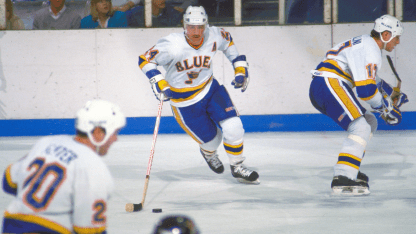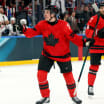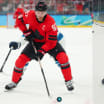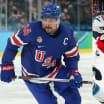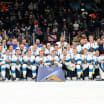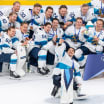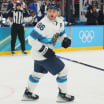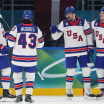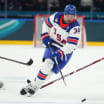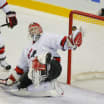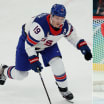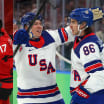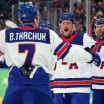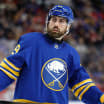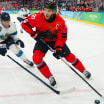Legendary hockey reporter Stan Fischler writes a weekly scrapbook for NHL.com. Fischler, known as "The Hockey Maven," shares his humor and insight with readers each week. This edition rolls back the calendar to 1983, when the St. Louis Blues were almost moved to Saskatoon, Saskatchewan, and Game 6 of the 1986 Campbell Conference Final, when the underdog Blues pulled off an astounding late-game comeback.
The St. Louis Blues' success as a thriving franchise did not come easy. In 1983, the doddering club came perilously close to moving to Saskatoon, Saskatchewan. Three years later, a miraculous comeback victory in the Stanley Cup Playoffs enhanced the love affair between the hockey team and its adoring city.
The fear of losing the Blues became real early in 1983, when previous owner Ralston Purina abandoned the franchise. When a Saskatchewan group head by World Hockey Association co-founder Bill Hunter made a serious bid for the team, the NHL Board of Governors rejected it by a 15-3 vote and was ready to fold the franchise. Just 10 days before the League's deadline for closing shop, vending machine magnate Harry Ornest suddenly stepped up to the plate with an offer.
"Ornest rescued the Blues from oblivion," wrote Los Angeles Times columnist Helene Elliott in 2019. A former minor league baseball player and minor league hockey referee, Ornest paid $3 million cash, plus $9 million in unsecured notes for the team and $5 million for the NHL-size, half-century old St. Louis Arena."
"I was determined to make this work," Ornest told me when we worked together on his unpublished autobiography, "but my budget for the team had to be tighter than tight. Keeping the team in business -- and competitive -- would be a huge challenge."
Because the sale took place after the annual NHL Draft, the Blues were denied any player choices in 1983. Undaunted, Ornest compensated by hiring a savvy high command. His general manager was the loquacious Ron Caron, a former assistant GM of the Montreal Canadiens, Caron then imported ex-Quebec Nordiques coach Jacques Demers.
"It was a match made in hockey heaven," Ornest said. "Ron was able to extract the best from our limited personnel. Meanwhile, Demers was a real sleeper who'd turn out to be one of the best -- and most likeable -- coaches of his era."
Despite a bare bones budget, the Blues gained consecutive playoff berths for three straight years. A frugal Caron sent his highest-priced player, goalie Mike Liut, to the Hartford Whalers for promising goalie Greg Millen and 1980 "Miracle on Ice" forward Mark Johnson on Feb. 21, 1985.
"Their combined salaries," Ornest boasted, "was less than what I was paying Liut."
With an emaciated roster, the Blues still managed to make the playoffs in 1985-86; they had acquired Rick Wamsley from the Canadiens on June 9, 1984, to give Demers a pair of first-class goalies.
"We were terrific underdogs because of injuries to key players like Brian Sutter and Greg Paslawski, who were out for long periods of time," Ornest said, "but they were back when we opened the playoffs against Minnesota."
"Things were so bad, that I played on two lines, yet we managed to get our act together and beat the North Stars in the final game of the best-of-5 series," Blues sharpshooter Bernie Federko told Chuck O'Donnell in "The Game I'll Never Forget."
"Then we upset Toronto in the final game of that best-of-7 series."
Next, the upstart Blues played the Calgary Flames in the Campbell Conference Final. A heavy favorite, the Flames took a 3-2 series lead with Game 6 at St. Louis Arena on May 12, 1986.
At the eight-minute mark of the third period, the Flames had the series well in hand leading 5-2.
"It looked like our goose was cooked," Ornest said. "Like there were no more miracles for us after the two we got beating 'Minny' and the Leafs."
But there was one more and it began with coach Demers' words to his players:
"Let's win this one for 'Barc!'" he said for defenseman Barclay Plager, who at the time was battling cancer.
Sutter cashed in a rebound beating goalie Mike Vernon at 8:08 and it was a 5-3 game. Suddenly, the Arena came alive. With only 4:11 remaining, Paslawski put another puck past Vernon to make it 5-4. Still, the clock was the Blues' worst enemy as it ticked closer to the one-minute mark. The delirious crowd was screaming for just one more when the Blues dispatched the puck into Calgary's zone with Paslawski leading the chase.
"Vernon came out of his net to get the rubber and 'Pazzer' went after him, lifted his stick, stole the puck, came around the net and stuck it in," Federko said.
The game was tied 5-5 with 1:08 left. Although the venerable arena rocked like never before, the miracle was incomplete going into overtime. Tantalizingly, more than seven minutes elapsed as the teams exchanged four shots apiece and Vernon and Wamsley stood flawlessly tall.
With the clock approaching eight minutes, a forechecking Federko stole the puck from Flames defenseman Paul Reinhart. He then slid a slick pass to a charging Mark Hunter.
"The crowd rose to its feet," Federko remembered, "sensing that this could be the game-winner, but Vernon stopped Hunter's shot and it seemed that the Flames had dodged the bullet."
Wait a second! There was a rebound and it dribbled to Blues forward Doug Wickenheiser. The oft-maligned No. 1 pick by the Canadiens in the 1980 NHL Draft pushed it into the open net.
Ornest thought his ancient arena might collapse under the endless ovations. Federko would call it "The capper on a short series of little miracles." Many of the players would call it their "proudest moment" with the Blues, who lost 2-1 in Game 7 at Olympic Saddledome.
Wickenheiser, the hero, had reached the pinnacle of a career that sadly would end Jan. 12, 1999, when the man affectionately called "Wick" died of brain and lung cancer at the age of 37.
"Doug fought cancer like he fought opposing defensemen for the puck," Federko said, "battling courageously with all his might."
Then, a pause: "None of us would ever forget his goal that made 'The Monday Night Miracle' possible."
